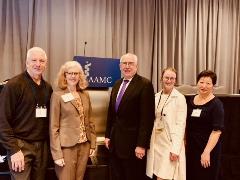The United States is facing a looming shortage of more than 121,000 physicians by 2030. In response, the Resident Physician Shortage Reduction Act of 2019—bipartisan legislation that would be a critical step to ensuring there are enough doctors to give patients the care they need—has been introduced in the House and the Senate. The 2 bills supporting the issue are S.348 supported by Senator Mendez (D-N.J.), Boozman (R-Ark.), and Schumer (D-N.Y.) as well as bill H.R. 1763 supported by Representative Sewell (D-AL) and Katko (R-NY).
The Resident Physician Shortage Reduction Act of 2019 will gradually and responsibly increase Medicare support for an additional 15,000 Graduate Medical Education (GME) residency positions over 5 years (3,000 slots per year). The legislation also includes a mandatory study on strategies for increasing workforce diversity in health professions. Medicare's partnership with teaching hospitals helps offset the cost of training physicians. By garnering support and co-sponsors for this bill right now, we can ensure funding for essential residencies.
How AAPM&R is Taking Action:

Through Liaison Activity
On April 4-6, 2019, AAPM&R past-president Gregory Worsowicz, MD, MBA, FAAPMR, attended the Council of Faculty and Academic Societies (CFAS) Meeting for the Association of American Medical Colleges (AAMC) in Atlanta, GA as AAPM&R’s representative. He met with multiple members of the AAMC Government Relations and Advocacy Group, advocating for the Academy’s position on the Resident Physician Shortage Reduction Act of 2019.
During the meeting, Dr. Worsowicz offered the Academy’s endorsement of the activities done by the AAMC on these issues. He also met with representatives from the Association of Academic Physiatrists (AAP) to work together in finding ways to combine efforts with the activities of the AAMC.
Dr. Worsowicz also attended the CFAS Advocacy Committee Meeting and asked the committee to explore funding outside of traditional areas which would allow residents to work in non-traditional funded areas such as Skilled Nursing Facilities (SNF) and Long-Term Acute Care (LTAC).
Through Coalition Work
The Academy’s Health Policy and Legislation Committee and Graduate Medical Education Committee worked collaboratively to sign on to a letter from the Association of American Medical Colleges (AAMC), urging Congress to support this new legislation. More than 60 other medical specialty societies signed on as well. View the letter here.
How YOU Can Take Action:
Send an Email to Congress
Your Academy is calling on all physiatrists to show their support by submitting a letter to Congress on this important issue through AAPM&R’s Action Center. More than 90 people have already sent more than 300 letters on this issue and the momentum continues to grow. We created the template for you so it only takes 2 minutes to submit! Join the movement and submit your letter before April 19.
Spread the Word on Social Media
Encourage your peers to make their voices heard by spreading the word on social media. Copy and paste this message on Facebook and Twitter and tag your PM&R peers:
I advocated for the future of #physiatry by telling my senators and representatives to support the Resident Physician Shortage Act of 2019! Submit your letter here: https://bit.ly/2U6nnry #PMRAdvocates
Learn More
Learn more about how AAPM&R advocates for PM&R, including continued action to prevent physician burnout. Stay tuned to your Academy communications for more updates. For additional information, you can also explore these resources: